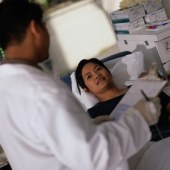- The Best Time of Day to Drink Bone Broth to Maximize Health Benefits
- 8 Ways to Increase Dopamine Naturally
- 7 Best Breads for Maintaining Stable Blood Sugar
- Gelatin vs. Collagen: Which is Best for Skin, Nails, and Joints?
- The Long-Term Effects of Daily Turmeric Supplements on Liver Health
- Could Your Grocery Store Meat Be Causing Recurring UTIs?
- Are You Making This Expensive Thermostat Error This Winter?
- Recognizing the Signs of Hypothyroidism
- 10 Strategies to Overcome Insomnia
- Could Artificial Sweeteners Be Aging the Brain Faster?
Just Seeing a Doctor May Boost the Odds of Surviving Melanoma


Regular doctor visits may reduce the risk of dying from melanoma skin cancer, according to a new study.
Researchers at Henry Ford Hospital in Detroit analyzed the cases of 251 white patients, average age 60, diagnosed with melanoma between 2001 and 2007. All of the patients had health insurance.
The risk of dying from melanoma was 70 percent lower among patients who had at least one visit with their family doctor or a specialist in the five years before they were diagnosed with the disease, the investigators found.
When factors such as age, gender and other health problems were accounted for, the risk of death was 90 percent lower in patients who had seen a specialist. The researchers also found that patients who underwent screening tests such as a colonoscopy or a fasting blood test also had a greatly decreased risk of death.
“This study is important because it’s not about having health insurance or having access to care. It’s about tapping into that care,” lead author and dermatologist Dr. Melody Eide said in a Henry Ford Health System news release.
“We know that people are always going to have struggles in their lives. They’re going to have unreliable transportation, children that they’re caring for, copays that are too expensive to pay,” Eide said. “What this study suggests is that these types of barriers may impact your prognosis for cancer if they impede your ability to make your medical care a priority.”
However, while the researchers found a link between seeing a doctor and improved survival in melanoma patients, it didn’t prove a cause-and-effect relationship.
The findings were scheduled for presentation Friday at the Society of Investigative Dermatology’s annual meeting in Albuquerque, N.M. Research presented at meetings should be considered preliminary until published in a peer-reviewed journal.
According to the U.S. National Institutes of Health, the number of melanoma deaths in the United States rose 5 percent in the early to mid-1990s, but have since leveled off.
More information
The American Cancer Society has more about melanoma.
Source: HealthDay
Copyright © 2026 HealthDay. All rights reserved.










